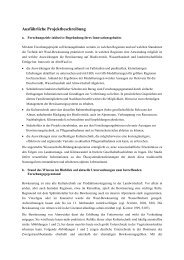Operationalisierung der regionalen Verwundbarkeit der ...
Operationalisierung der regionalen Verwundbarkeit der ...
Operationalisierung der regionalen Verwundbarkeit der ...
Erfolgreiche ePaper selbst erstellen
Machen Sie aus Ihren PDF Publikationen ein blätterbares Flipbook mit unserer einzigartigen Google optimierten e-Paper Software.
Ähnlich resümieren Patterson et al. (2010) mit Bezug auf Hurrican Cathrina und in Hinblick<br />
auf die Bedeutung von Sozialkapital in <strong>der</strong> Community-Resilienz im Allgemeinen: "On the<br />
positive side, well functioning community organizations have the trust of their members and<br />
possess the moral authority to urge cooperative behavior and teamwork that government<br />
lacks. They also have strong abilities to assess needs and distribute goods and services<br />
efficiently and equitably. Thus, observers often stress the importance of including<br />
communities in disaster response and creating meaningful partnerships between<br />
communities and government agencies." (Patterson et al. 2010: 138)<br />
Ein ähnliches Resümee zieht Murphy (2007) aus dem Vergleich von Blackouts in Kanada<br />
und USA: "This paper distinguishes between two types of emergency management at the<br />
local scale—municipal government responsibilities and community-level initiatives. It argues<br />
that these are interdependent, but separate aspects of emergency management.<br />
Communities, whether or not tied to particular places, are posited as being key, but often<br />
overlooked resources in both proactive and reactive phases of emergency management. Of<br />
particular importance within communities are the social capital resources (networks of strong<br />
and weak ties) that may work to improve a community’s resilience to risks and hazards. Two<br />
cases studies, the 2003 electricity power blackout in the eastern parts of both Canada and<br />
the United States and the 2000 water-borne disaster in Walkerton are utilised to demonstrate<br />
the concepts developed in the paper." (Murphy 2007: 297)<br />
Sozialkapital ist auf verschiedene Weise für Community-Resilienz relevant. Ein wichtiger<br />
Aspekt - neben an<strong>der</strong>en - besteht darin, dass die Fähigkeit zur kollektiven Problemlösung vor<br />
allem vom Sozialkapital abhängt. Kollektive Problemlösungsfähigkeiten sind für Resilienz<br />
von entscheiden<strong>der</strong> Bedeutung, weil gerade die Komplexität gravieren<strong>der</strong> Krisen die<br />
Möglichkeiten <strong>der</strong> Top-Down-Steuerung übersteigt, wie Norris et al. die diesbezügliche<br />
Literatur resümieren: "Endangered communities must be able to learn about their risks and<br />
options and work together flexibly and creatively to solve problems. Longstaff (2005) argued<br />
that the capacity to acquire trusted and accurate information, to reflect on that information<br />
critically, and to solve emerging problems is far more important for community resilience than<br />
is a detailed security plan that rarely foresees all contingencies (see also Comfort 2005;<br />
Handmer and Dovers 1996). This point brings us to Community Competence, which we view<br />
as the networked equivalent of human agency, a term that is more broadly applicable across<br />
levels of analysis. Community competence has to do with collective action and decisionmaking,<br />
capacities that may stem from collective efficacy and empowerment." (Norris et al.<br />
2008: 141) Ähnlich sehen dies Cutter et al. (2008), die Kommandostrukturen als die<br />
Community-Resilienz schwächend bewerten (Cutter et al. 2008: 604).<br />
Dies wird empirisch gestützt, etwa durch Forschung zur Resilienz gegenüber Tsunami<br />
Ereignissen, zum Beispiel von Berke et al. (2008): "Findings indicate that social capital<br />
represents a potential for collective action, but design of aid programmes may prevent such<br />
action. Programmes that emphasised bottom-up aid delivery mobilised local social capital<br />
and directed it toward obtaining resources that fit local needs and capabilities. Alternatively,<br />
35



